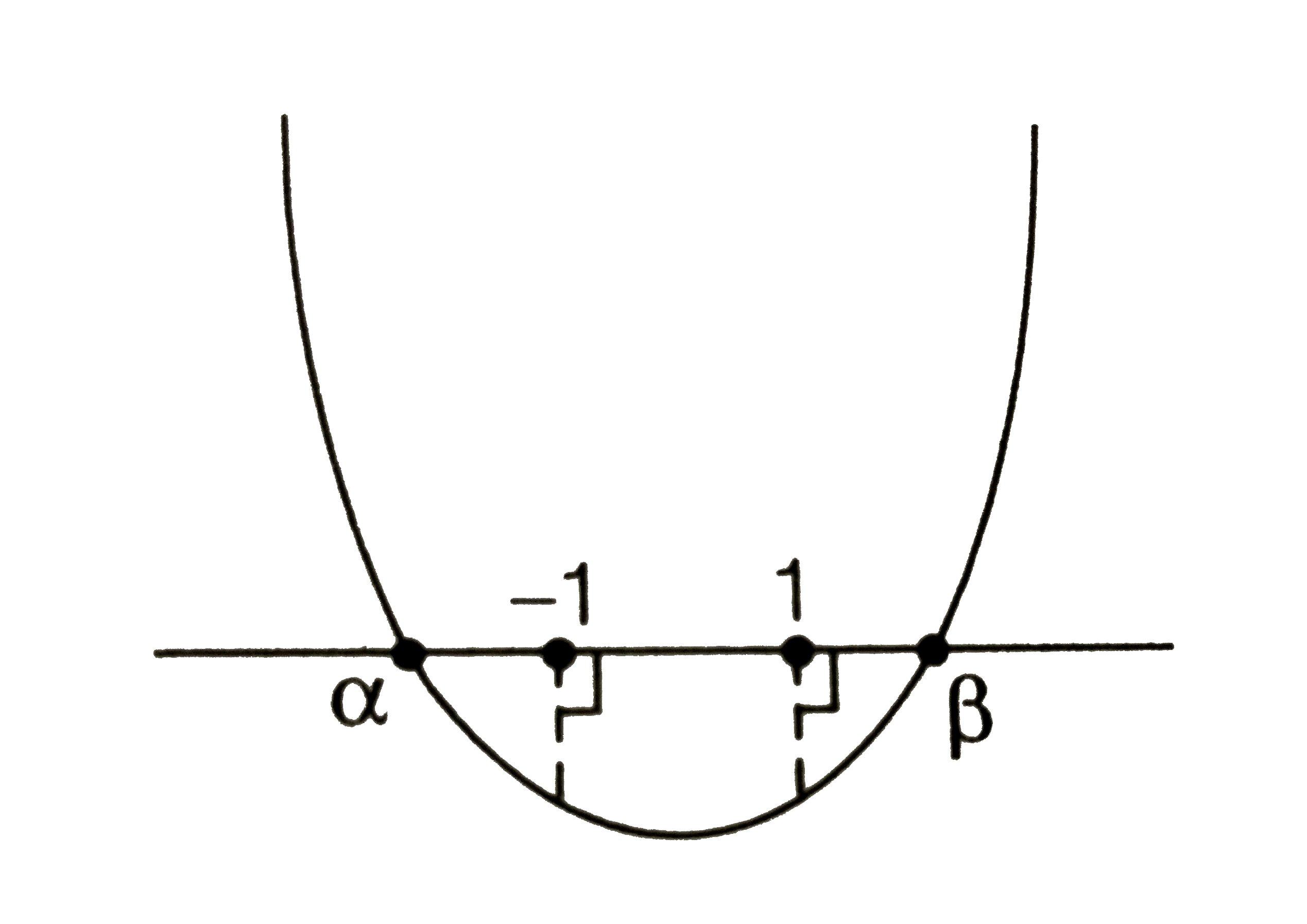Let a,b,c be real. If ax2+bx+c=0 has two real roots α and β,where α < −1 and β > 1 , then show that 1+ca+∣∣∣ba∣∣∣<0Solution in Punjabi
Since α<−1 and β>1
α+λ=−1 and β=1+μ[λ,μ>0]
Now 1+ca+∣∣∣ba∣∣∣=1+αβ+|α+β|
=1+(−1−λ)(1+μ)+|−1−λ+1+μ|
=1−1−μ−1λ−λμ+|μ−λ|
=−μ−λ−λμ+μ−λ [if μ>λ]
and =−μ−λ−λμ+λ−μ [if λ>μ]
∴1+ca+∣∣∣ba∣∣∣=−2lameda−λμ or −2μ−λμ
On both cases 1+ca+∣∣∣ba∣∣∣<0[∵λ,μ>0]
Aliter
∵ax2+bx+c=0,a≠0
x2+bax+ca=0
Let f(x)=x2+bax+ca
f(−1)<0 and f(1)<0
⇒1−ba+ca<0 and 1+ba+ca<0
Then 1+∣∣∣ba∣∣∣+ca<0

Topper's Solved these Questions
- THEORY OF EQUATIONSBOOK - ARIHANT MATHSCHAPTER - THEORY OF EQUATIONSEXERCISE - Exercise For Session 1
11 Videos
- THEORY OF EQUATIONSBOOK - ARIHANT MATHSCHAPTER - THEORY OF EQUATIONSEXERCISE - Exercise For Session 2
10 Videos
- THE STRAIGHT LINESBOOK - ARIHANT MATHSCHAPTER - THE STRAIGHT LINESEXERCISE - The Straight Lines Exercise 8 : (Questions Asked in Previous 13 years Exams)
1 Videos
- THREE DIMENSIONAL COORDINATE SYSTEMBOOK - ARIHANT MATHSCHAPTER - THREE DIMENSIONAL COORDINATE SYSTEMEXERCISE - Three Dimensional Coordinate System Exercise 12 : Question Asked in Previous Years Exam
2 Videos
Similar Questions
If (a2−1)x2+(a−1)x+a2−4a+3=0 is identity in x , then find the value of a .
View SolutionIf α and β are the roots of the equation 2x2−3x+4=0, then the equation whose roots are α2 and β2, is a. 4x2+7x+16=0 b. 4x2+7x+6=0 c. 4x2+7x+1=0 d. 4x2−7x+16=0
View SolutionSolve the following system of inequalities graphically
x+5y≤25,2x+2y≥2,2x−2y≤0,x≥0,y≥0
View SolutionConsider the line L1:x−12=y−1=z+31,L2:x−41=y+31=z+32 find the angle between them.
View SolutionLet a,b,c be real. If ax2+bx+c=0 has two real roots α and β, where α⟨−1 and β⟩1, then show that 1+ca+∣∣∣ba∣∣∣<0
View SolutionLet a,b,c be real numbers with a≠0andletα,β be the roots of the equation ax2+bx+c=0. Express the roots of a3x2+abcx+c3=0 in terms of α,β.
View SolutionLet α,β be the roots of the equation (x−a)(x−b)=c,c≠0 Then the roots of the equation (x−α)(x−β)+c=0 are a,c (b) b,c a,b (d) a+c,b+c
View SolutionLet a,b,c be real numbers with a =0 and let alpha,beta be the roots of the equation ax^(2)+bx+C=0. Express the roots of a^(3)x^(2)+abcx+c^(3)=0 in terms of alpha,beta
View SolutionIf alpha,beta are non-real roots of ax^(2)+bx+c=0,(a,b,c in R), then (A)alpha beta=1(B)alpha=beta(C)(a beta)/(alpha beta)=1(D)alpha=bar(beta)
View SolutionLet a,b,c be real if ax2+bx+c=0 has two real roots α and β where a<−2 and β>2, then
View Solutionमाना a,b,c वास्तविक है| यदि ax2+bx+c=0 के दो वास्तविक मूल α और β है, जहाँ α<−1 और β>1, तब दिखाए कि
1+ca+∣∣∣ba∣∣∣<0
View SolutionLet a, b, c be real, if ax2+bx+c=0 has two real roots α,β, where a<−1andβ>1, then the value of 1+ca+∣∣∣ba∣∣∣ is :
View SolutionIf a, b, c are real if ax2+bx+c=0 has two real roots α,β where a<−1,β>1 then
View SolutionShow that a2x−α+b2x−β+c2x−γ−x+δ=0 has only real roots if a,b,c,α,β,γ,δ are all real .
View SolutionLet a, b, c be real, if ax2+bx+c=0 has two real roots α,β, where a<−1andβ>1, then the value of 1+ca+∣∣∣ba∣∣∣ is :
View SolutionLet a, b, c be real, if ax2+bx+c=0 has two real roots α,β, where a<−1andβ>1, then the value of 1+ca+∣∣∣ba∣∣∣ is :
View Solution
